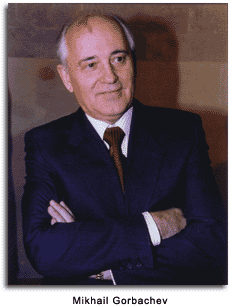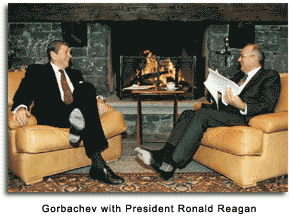Mikhail Gorbachev was perhaps the most significant player in putting an end to the Cold War and effecting the Union of Soviet Socialist Republics' gradual dismemberment.
 Aware that the U.S.S.R.'s economy was on the brink of collapse, Gorbachev proceeded to offer concessions to American arms negotiators and even announced a unilateral reduction in Soviet troop strength. In short order, the arms race would come to an end.
In his position as General Secretary between 1985 to 1991, Gorbachev introduced policies of glasnost (openness), and perestroika (economic restructuring). These new policies conceded more personal freedoms for Soviet people and promoted a friendlier environment towards international commerce.
Aware that the U.S.S.R.'s economy was on the brink of collapse, Gorbachev proceeded to offer concessions to American arms negotiators and even announced a unilateral reduction in Soviet troop strength. In short order, the arms race would come to an end.
In his position as General Secretary between 1985 to 1991, Gorbachev introduced policies of glasnost (openness), and perestroika (economic restructuring). These new policies conceded more personal freedoms for Soviet people and promoted a friendlier environment towards international commerce.
Influence and education
Mikhail Sergeyevich Gorbachev was born on March 2, 1931, in Privolnoye, Stavropol, an agricultural province of Soviet Russia.
As a young boy, Mikhail was exposed to Socialist indoctrination. He became a member of the Communist Party in 1952.
Gorbachev attended Moscow State University's law school, where in 1953 he married a philosophy student, Raisa Maksimovna Titorenko
(1932?–99), and graduated in 1956. He was then eligible to become a more active member of the Communist Party. The Gorbachev marriage produced a daughter who married and produced two
granddaughters.
Gorbachev spent much time working for the party, but great problems led him to make big changes.
Eventually, he matriculated in the Stavropol Agriculture Institute, from which he was graduated in 1967 with a degree in agriculture economy. With his experience in that field and holding command positions in the party, he fashioned a famous 10-year food plan for the country in 1974. Unfortunately, the scheme was set aside when an extremely bad harvest rendered it into a failure.
 The beginning of radical change
Owing mainly to looming economic collapse, the 1989 Congress of People's Deputies voted in March 1990 to end the Communist Party's control over the government, and the body elected Gorbachev executive president. During 1990 and 1991, however, the reform drive stalled, and Gorbachev appeared only to be pacifying holdout hardliners. The hardliners were disgruntled over the Soviet empire's deterioration and progressive marginalization of the Communist Party.
An unsuccessful anti-Premier Gorbachev coup by hardliners in August 1991 nevertheless shifted greater authority to the Russian Republic's president, Boris Yeltsin, and greatly accelerated change.
Gorbachev proscribed the Communist Party, granted independence to the Baltic States, and proposed a much looser, chiefly economic federation among the remaining republics. With the formation of the Commonwealth of Independent States (CIS) on December 8, 1991, the federal government of the Soviet Union became dissolved, and on December 25, Gorbachev resigned as president.
The statesman's latter days
Gorbachev stands for what he calls "democratic socialism," or "socialism with a human face." He currently heads the Gorbachev Foundation, Green Cross International, and the Civic Forum movement. Gorbachev now lives in Moscow.
The beginning of radical change
Owing mainly to looming economic collapse, the 1989 Congress of People's Deputies voted in March 1990 to end the Communist Party's control over the government, and the body elected Gorbachev executive president. During 1990 and 1991, however, the reform drive stalled, and Gorbachev appeared only to be pacifying holdout hardliners. The hardliners were disgruntled over the Soviet empire's deterioration and progressive marginalization of the Communist Party.
An unsuccessful anti-Premier Gorbachev coup by hardliners in August 1991 nevertheless shifted greater authority to the Russian Republic's president, Boris Yeltsin, and greatly accelerated change.
Gorbachev proscribed the Communist Party, granted independence to the Baltic States, and proposed a much looser, chiefly economic federation among the remaining republics. With the formation of the Commonwealth of Independent States (CIS) on December 8, 1991, the federal government of the Soviet Union became dissolved, and on December 25, Gorbachev resigned as president.
The statesman's latter days
Gorbachev stands for what he calls "democratic socialism," or "socialism with a human face." He currently heads the Gorbachev Foundation, Green Cross International, and the Civic Forum movement. Gorbachev now lives in Moscow.